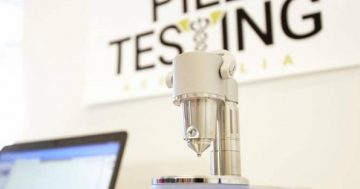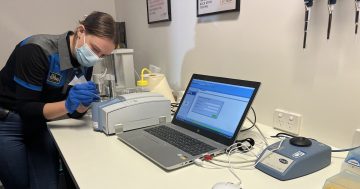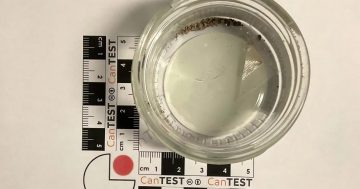
For a long time the public has been ahead of politicians in knowing that we need to take a different approach to drug use—a health-focused approach that makes keeping our young people safe the first priority. The community knows that the ‘law and order’ approach to drugs is not working, and across Australia young people are getting sick, and dying, because of it.
That’s why we’ve seen the Canberra community back the campaign for a pill testing trial so strongly. The ACT Greens are proud to have led the political debate on this issue, including proposing pill testing as a key election commitment in 2016 and continuing the push at every opportunity since.
But it took far more than the will of the community to pull-off the nation’s first pill testing service at Groovin The Moo in Canberra. Getting this pill testing trial over the line required a fundamental shift in the political mindset around how we should treat drug use.
Prior to the 2016 ACT election, both major parties were voting down the Greens calls for drug law reform in the Legislative Assembly. So how do you get progressive drug law reform over the line in the face of intractable conservative ideology on one side and hesitation on the other?
The international evidence makes the case for pill testing loud and clear. In Europe, where pill testing is already commonplace, results have shown that it can save lives and influence people who use drugs to make safer choices. A study in Austria found that two-thirds of users who were informed by a government-funded pill testing service of potential toxic harms decided not to consume their drugs, and told their friends not to either. In Switzerland, research has found that a pill-testing service is often the first contact with social support systems for many users. Contrary to the claims of opponents, pill testing does not lead to an increase in drug taking but rather the information offered by these services can instead lead to reduced consumption.
In Canberra, crowds of young people congregate for two major music festivals annually—Groovin The Moo in Autumn and Spilt Milk in Spring, making opportunities for a pill testing trial at a large festival few and far between. By November 2016 the Greens found ourselves again holding the balance of power in a Labor-Greens ACT Government but struggling to secure commitment to policy development on pill testing from our political peers. However, we did find allies in national drug reform advocates, including emergency doctor and Australian Drug Observatory’s Dr David Caldicott, Harm Reduction Australia’s Gino Vumbaca and respected senior law enforcement experts Frank Hansen and Mick Palmer. We joined forces to further lobby Labor Ministers to support pill testing at the upcoming Spilt Milk festival, but to no avail.
At the same time, the NSW Government was doubling down on its law and order approach to drug use, with sniffer dogs patrolling music festivals. The evidence base for this approach is poor at best – a NSW Government review of sniffer dogs found that police uncovered drugs in only 26% of cases where the dog gave a positive indication. We heard reports of at least two cases where young Australians died when they swallowed all of their drugs at once to avoid detection by sniffer dogs. These are the tragic and very real consequences of this sort of ill-informed drug policy.
For years it has been assumed that police would oppose a pill testing trial because they saw it as endorsing illegal drug taking. However, despite the tough rhetoric, police are frustrated at the harm they continue to see from young people experimenting with drugs. For pill testing to work, a level of police discretion was needed– discretion to continue targeting dealers to stem supply, while creating an environment where people felt safe to engage with health services. Police already exercise this type of discretion around safe injecting rooms because they understand the health and safety benefits they provide.
What many people don’t realise is that no change of law is required to carry out pill testing in Australia—only the authorisation of the state or territory government. The legislative status of illicit drugs remains unchanged, with possession, supply and use still illegal. To make pill testing work, coordination with police and agreement on a code of conduct is essential and entirely achievable.
With the ongoing setbacks it was clear that we needed more ducks, arranged in straighter lines. In early 2017, Dr Calidcott and fellow experts from Harm Reduction Australia, the Noffs Foundation and DanceWize formed the STA-SAFE consortium. With Groovin The Moo (GTM) in their sights, the consortium meticulously prepared an application for a pill testing trial and submitted it to the ACT Government. The promoters of GTM were clear that their support for pill testing was contingent on ACT Government endorsement. This endorsement was declined and the May 2017 festival went ahead without pill testing.
With the ongoing advocacy of STA-SAFE alongside our Keep Canberra Safe campaign, the ACT Government made an important symbolic shift with government responsibility for pill testing moving from a legal decision within government to a health and harm-minimisation decision. Following a detailed investigation and risk assessment by the Chief Health Officer and many hours of work from the consortium to answer all of the relevant questions, in September 2017 the Government at last approved a pill testing trial for the Spilt Milk festival. The STA-SAFE consortium were well-prepared to run the service, with high quality testing equipment and medical experts ready to go.
Then, in a devastating development, Spilt Milk organisers retracted their earlier support for pill testing. There were rumours that the National Capital Authority had refused to provide approval for the trial on Federal Government land. It remains unclear if and what political intervention may have occurred between the Canberra Liberals and their Federal counterparts, but I suspected that the Canberra Liberals used their back channels to undermine the ACT Government’s approval.
Reports from Spilt Milk suggested that with the expert-run pill testing service pulled, patrons turned instead to ‘DIY kits’ in an effort to self-determine a pill’s compounds. These reagent testing kits are significantly less reliable and failed to provide an opportunity to give information to consumers and collect data about what drugs were in the market at the time. A formal pill testing scheme, with expert scientific, medical and counselling staff on hand, would have been a far safer option.
We turned our attention to the 2018 Groovin The Moo festival, but this time the mood was different. We already had ACT Government approval—including from health authorities, ACT Policing and ACT Ambulance Service—and the support of the University of Canberra, where the festival takes place. What we did not expect was push back from the event promoter due to potential legal issues around insurance and public liability. There was now a danger that the festival could come and go and no agreement would be reached.
Approval for the trial was still hanging in the balance until just days before, until finally, agreement was reached. I’m so pleased to be able to say that on 29 April 2018, the nation’s first official and approved pill testing trial went ahead at Groovin The Moo in Canberra.
On the day I was lucky enough to attend the festival and have an opportunity to go inside the pill testing tent and be shown how it all worked. It was professionally run, with clear explanations to ensure that participants understood all the legal and health risks. Each person was asked what substance they thought they had and where they got it. Once it was run through the spectrometer (with over 35,000 chemicals in its database), you then found out whether it was the expected substance or not. Its effects were explained to you by a medic and a wristband with a reference number was allocated – so if anything went wrong, paramedics would be able to quickly find out what you’d taken.
While the detailed results are still being looked at, initial data from the pill testing service shows that it was a success and helped keep young people safe from drug harm. On the day, 128 people participated in the service, including some who asked for health advice regarding drug use without getting a sample tested. Eighty-five samples were tested, of which 50% were found to be pure MDMA and 50% were found to contain ‘other’ substances including lactose, sweetener and paint. Alarmingly, two of the samples were deadly. As well as helping festival-goers to avoid unnecessary risks, data from the testing means that health experts and police will have a better understanding of what drugs are on the market. With this information, they will be able to warn the community of any potential safety risks.
Of course, this momentous achievement could not have occurred without the hard work of so many people. I want to acknowledge the efforts of the STA-SAFE consortium, the University of Canberra, Cattleyard Promotions, artists, supporters, the ACT Government, including ACT Policing and the ACT Ambulance Service, and the Canberra community in realising the trial.
This is a significant step forward in our approach to drug law reform—now we’ve shown that pill testing in Australia can be as successful as evidence from overseas indicated, we hope to see it implemented across the country without delay.
Shane Rattenbury, ACT Greens Leader and Spokesperson for Drug Law Reform.




















